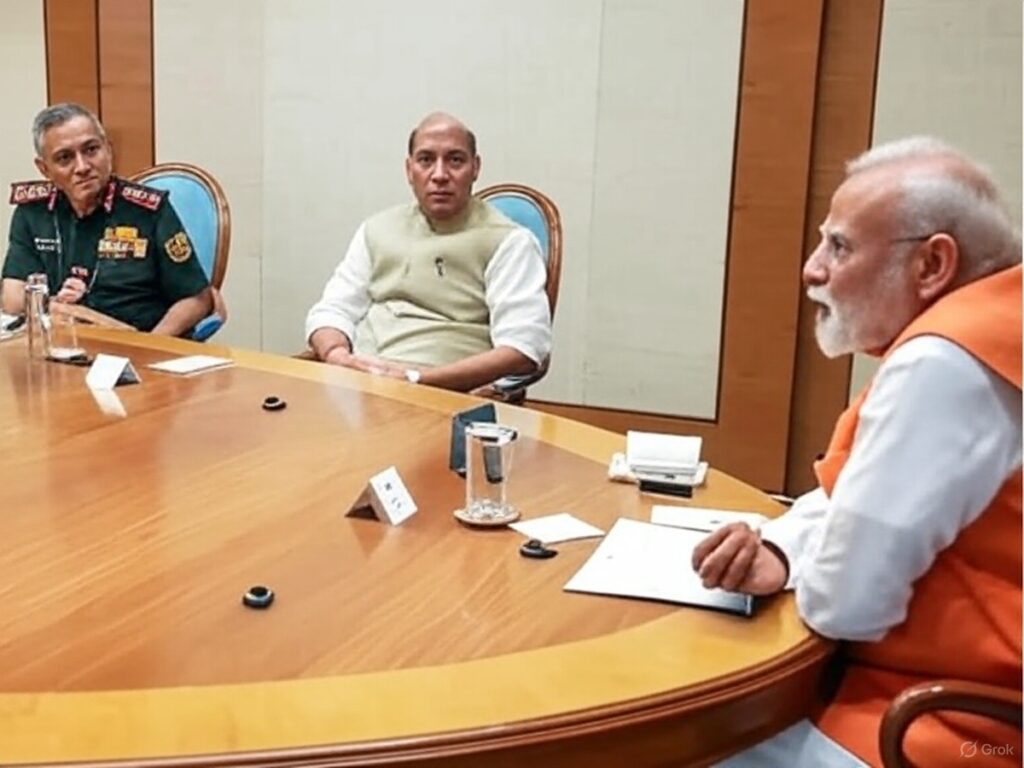Is Today a Day of Reckoning for Pakistan? PM Modi Chairs Crucial CCS Meeting Amid Rising Tensions
Following the deadly Pahalgam terror attack on April 22, 2025, which claimed 26 lives, Prime Minister Narendra Modi is taking decisive steps that could reshape India-Pakistan relations. With tensions at a boiling point, Modi’s series of high-stakes meetings today, starting with the Cabinet Committee on Security (CCS), signals potential big decisions that have left Pakistan on edge.
By New Delhi Post Desk, New Delhi:
Prime Minister Narendra Modi is visibly furious after the Pahalgam attack, and his actions reflect a no-nonsense approach. On April 29, 2025, he chaired a high-level meeting with the armed forces, granting them “complete operational freedom” to decide the mode, targets, and timing of their response. Attendees included Defence Minister Rajnath Singh, National Security Advisor Ajit Doval, Chief of Defence Staff General Anil Chauhan, and the three service chiefs. This move has rattled Pakistan, which now fears imminent retaliation.
CCS Meeting Kicks Off: A Prelude to Tough Measures
At 11 AM IST on April 30, 2025, PM Modi began chairing the CCS meeting at his residence, the second such meeting since the attack. Key members present include Defence Minister Rajnath Singh, Home Minister Amit Shah, Finance Minister Nirmala Sitharaman, and External Affairs Minister S. Jaishankar. The CCS, India’s top decision-making body on national security, had previously approved stringent measures against Pakistan on April 23, such as suspending the Indus Waters Treaty, closing the Attari border, and cancelling visas for Pakistani nationals. Today’s meeting is expected to deliberate on further actions, with Pakistan’s role in sponsoring cross-border terrorism under scrutiny.
CCPA Meeting to Follow: Political and Economic Strategies in Focus
Following the CCS, PM Modi will chair the Cabinet Committee on Political Affairs (CCPA) meeting, often dubbed the “super cabinet.” The CCPA, which last met after the 2019 Pulwama attack to strategize India’s response, includes key ministers like Rajnath Singh, Amit Shah, Nitin Gadkari, Nirmala Sitharaman, Piyush Goyal, J.P. Nadda, Ram Mohan Naidu, Jeetan Ram Manjhi, Sarbananda Sonowal, Bhupender Yadav, Annpurna Devi, Kiren Rijiju, and G. Kishan Reddy. This body reviews critical political and economic issues and has the authority to make binding decisions, potentially shaping India’s next steps against Pakistan.
CCEA and Cabinet Meetings: A Day of Major Decisions
Later today, the Cabinet Committee on Economic Affairs (CCEA) will convene to address economic ramifications, followed by a full Cabinet meeting. These sessions are poised to finalize significant decisions, possibly including military, diplomatic, or economic measures against Pakistan. The outcomes could mark a turning point in the ongoing crisis, especially as Pakistan’s Information Minister Attaullah Tarar claimed on April 30 that India might launch a military strike within 24-36 hours—a claim that remains unverified but underscores the heightened tensions.


